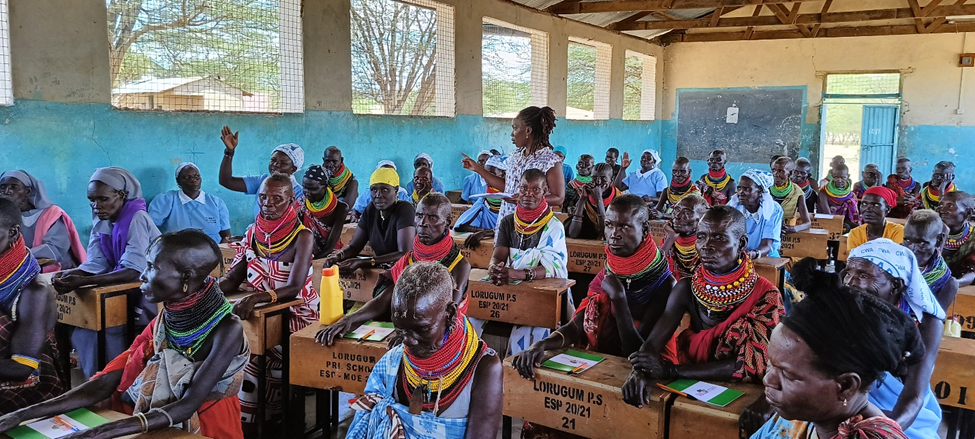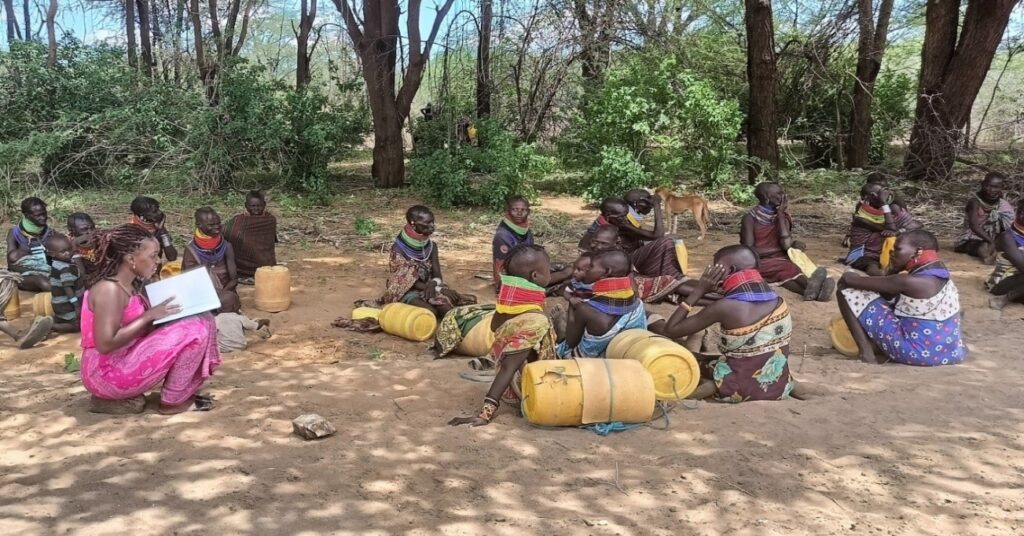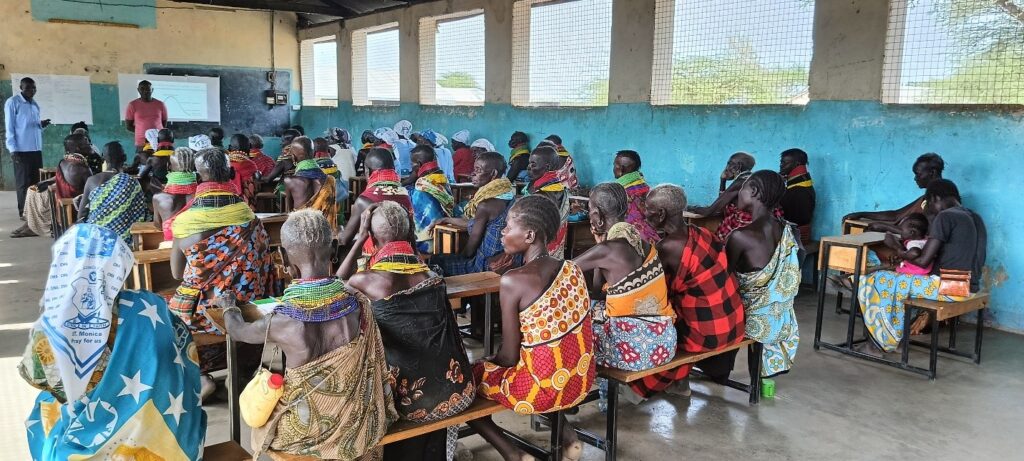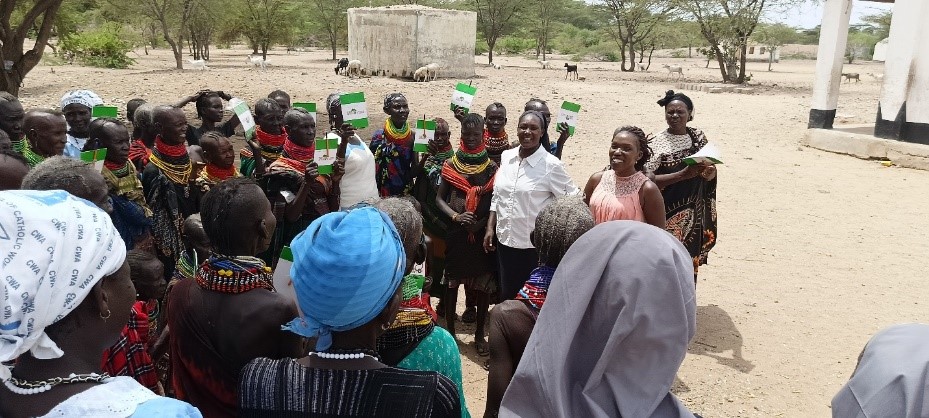By: Judith Akedi MA,
Northern Kenya has historically experienced inter-ethnic pastoralist community conflicts, involving issues of competition over scarcity of pasture and water, traditional cultural practices and ethnicity. The insecurity along the borders with the bordering countries of South Sudan, Ethiopia, Somalia, and Uganda has also led to frequent cross-border confrontations and the extensive proliferation of illicit Small Arms and Light Weapons (SALW) in the region. Shalom-SCCRR is intervening and has pledged its long-term support for the communities residing in this area. The region’s noteworthy negative characteristics include environmental degradation, the proliferation of illicit weapons, precarious livelihoods, marginalization and underdevelopment.
However, underpinning these issues are major structural violence factors, centering on core resources, infrastructure-insecurity, state neglect, and illicit activities in spheres of the political economy – commercialization of livestock raiding and proliferation of small arms among others (Devine 2016).

Despite being disproportionately affected by conflict, women are underrepresented in peacebuilding on a national level because of gendered power relations that prohibit them from gaining access to resources. In Lorgum, a town 52 kilometers from Lodwar, that borders Northern Uganda in the northwest, and to the west, falls along the tumultuous Turkana-Pokot borderline, women, especially in rural areas, are the primary providers of water, food, and energy at the household level. They thus suffer the most as a result of ineffective resource management. In addition, women are frequently forced to take on non-traditional roles during times of violent conflicts.
In this region, it’s common to see women caring for livestock, while carrying children on their backs. Men are usually on the lookout waiting to confront enemies who may reproach them with the intention of stealing their livestock. As such, its common to meet young men toting AK 47 rifles which they use to protect themselves from any attack and also stealing livestock from rival ethnic others.

According to Dorcas Lokaale, one of the women leader’s who attended our workshop, livestock rustling and banditry have resulted in a large number of fatalities and the uprooting of many different demographic groupings. She observes that many families have broken up, others evicted from their homes, and had their way of life distorted. As a result of their acute destabilization, many families are now being housed as IDPs. She observes that women and children are the most affected by these violent conflicts and have suffered severe anguish, animosity, suspicion and psychological torture.
Men make up the majority of war victims and casualties. Due to the uptake in hostilities, many women have lost their spouses and sources of income. Lifestyles have been disrupted as women and their children have been moved to settlement centers for security reasons. From these locations, women strive to provide for their families by running small enterprises, hawking goods, or making and selling charcoal. As a result of their participation in these activities, many of them have been exposed to the risk of HIV infection, and some have also become victims of health afflicting addictions. In some places, a woman might have been sent back to her parents if she belonged to a different ethnic group. In addition, there were reports of rape and kidnapping of women.
There are a lot of orphans and more homes where the only adults are the children. Conflicts have resulted in the separation of children from their parents when they are accommodated by other families. They run the risk of famine and malnutrition as a result. Many newborns have also died from exposure to the cold and illness as mothers sleep and hide in the bush with their children when ethnic communities are fighting. In addition, when mothers migrate, children miss out on getting their vaccines. Many children do not go to school.

Conflict in these areas has substantially harmed women’s rights and peacebuilding. Women in this area have not been able to properly contribute to conflict transformation because they lack analytical knowledge, skills, and a conducive economic, social, and political context. The absence of long-term conflict management techniques restricts the potential for conflict prevention. This is made worse by the predominance of specific cultural traditions that forbid participation by women in key community decision-making processes.
Shalom-SCCRR through constant attention to the needs of women first of all enabled the increase of participation of women in conflict transformation and peacebuilding training workshops. This has led to the empowerment of an expansive understanding of the key underlying causes of these conflicts and conflict dynamics in general. Moreover, women are enabled with acquiring a range of practical skills that are essential in the management of conflict and the handling of post-conflict situations.
Both inside Kenya’s Arid and Semi-Arid Lands (ASALs) and beyond international borders, livestock and human movement is quite high. In certain ASAL regions, drought, floods, and famine have all become more frequent and severe in the recent past. As a result, the communities of pastoralists have suffered, especially the women, whose vulnerability is already increased by the regular cattle raids that are endemic in these areas. Key concerns in ASALs continue to be violence against women and children, negative psycho-social effects of addictions, marginalization of women, young people, and people with disabilities, population increase, unemployment, and the demand for unskilled labor.

Speaking to one of the women leaders, Paulina Akiru describes how her neighborhood has been torn apart for years, ruined by raids that have since taken on a retaliatory component. Paulina’s mind was racing with recollections as we strolled along the hallway. She halted, resting her elbows on the rails, gazing down at the landscape. Paulina was obviously quite distressed over something from her history. She thought back to the brutal Pokot raid, which she could only describe as a “massacre” and which has since left the Turkana who lost loved ones with deep wounds. Paulina is still grieving, and something about the attack has continued to worry her (It is also worth noting that there are many Pokot women also suffering similar conflict memory turmoil issues due to attacks by the Turkana on their ethnic community!)
One of Shalom-SCCRR’s objectives is to cultivate conflict resolution between ethnic groups wherever we work. Through our training program, we aim to train various actors in conflict environs on how best to transform conflict to a place of positive peace. Evident acceptance and support of conflict resolution initiatives marks a realization on the need to involve women in conflict resolution efforts. Shalom-SCCRR was delighted to have 60 Turkana women leaders attend our workshop in Lorgum Turkana County; a positive transformative force for good, to be reckoned with going forward!!!
Author:
Mrs. Judith Akedi Otsieno MA, Shalom-SCCRR Project Officer Nairobi; & Women and Children’s Projects
Relevant Links
- Shalom- SCCRR. (2023) 2009-2022 Shalom-SCCRR Results and Achievements.https://shalomconflictcenter.org/wp-content/uploads/2023/06/13-Years-of-Shalom-SCCRR-2009-2022-SV-20230624.pdf
- Shalom-SCCRR. (2022). Shalom Empowerment Center (SEC) Addressing Violence against Women and Children: Concept Document. https://shalomconflictcenter.org/eastern-africa-shalom-empowerment-center-sec-addressing-violence-against-women-and-children-concept-document/
- Shalom-SCCRR. (2023). Prof. Wanakayi K. Omoka’s Understanding of the Philosophy and Work of Shalom-SCCRR Recollected; Augmented with 2022 Results by the Dept. of Monitoring, Evaluation, Research, and Learning (MERL). https://shalomconflictcenter.org/recalling-prof-wanakayi-k-omoka-phd-understanding-of-the-philosophy-and-work-of-shalom-sccrr-augmented-with-2022-shalom-sccrrs-achievements-and-results/
- Awed, A. (2021). The Girl-Child: Shalom-SCCRR Impacting Education & the Lives of Young Girls in Marginalized and Remote Locations in Eastern Africa. https://shalomconflictcenter.org/the-girl-child-shalom-sccrr-impacting-the-lives-of-young-girls-in-marginalized-and-remote-locations-in-eastern-africa/
- Domit, P. (2023). Wonderful Welcome and Experience with the Shalom Center for Conflict Resolution and Reconciliation (SCCRR). https://shalomconflictcenter.org/wonderful-welcome-and-experience-with-the-shalom-center-for-conflict-resolution-and-reconciliation-sccrr/
- Shalom-SCCRR. (2023). Shalom Empowerment Center (SEC) 2022 Results & Achievements. https://shalomconflictcenter.org/shalom-empowerment-center-sec-2022-results-and-achievements/
- Otsieno, J. & Kibe, E. (2022). Shalom Empowerment Center (SEC) Addressing Violence against Women and Children: A Unique Shalom-SCCRR Initiative Opened. https://shalomconflictcenter.org/shalom-empowerment-center-sec-addressing-violence-against-women-and-children-a-unique-shalom-sccrr-initiative-opened/
- Adhiambo, V. (2023). Bridging Divides: A Personal Account of Working with the Shalom Center for Conflict Resolution and Reconciliation. https://shalomconflictcenter.org/bridging-divides-a-personal-account-of-working-with-the-shalom-center-for-conflict-resolution-and-reconciliation/
- Tembo, E. (2023). St. Josphat’s House (Kabiria-Riruta), A Place To Go; Some Shalom-SCCRR Projects in Action. https://shalomconflictcenter.org/st-josphats-house-kabiria-riruta-a-place-to-go-some-shalom-sccrr-projects-in-action/
- Wamae, J. (2020). Shalom-SCCRR’s Contribution to Women in Conflict Transformation and Peacebuilding. https://shalomconflictcenter.org/shalom-sccrrs-contribution-to-women-in-conflict-transformation-and-peacebuilding/
- Devine, P., (2016). Persistent Conflict between the Pokot and the Turkana: Causes and Policy Implications [Unpublished Ph.D. Thesis]. University of Nairobi, Kenya. http://erepository.uonbi.ac.ke/handle/11295/97476
- Devine, P. R. (2023). Shalom-SCCRR Chairman’s Report on Progress and Achievements in 2022. https://shalomconflictcenter.org/chairmans-report-on-progress-and-achievements-in-2022/

